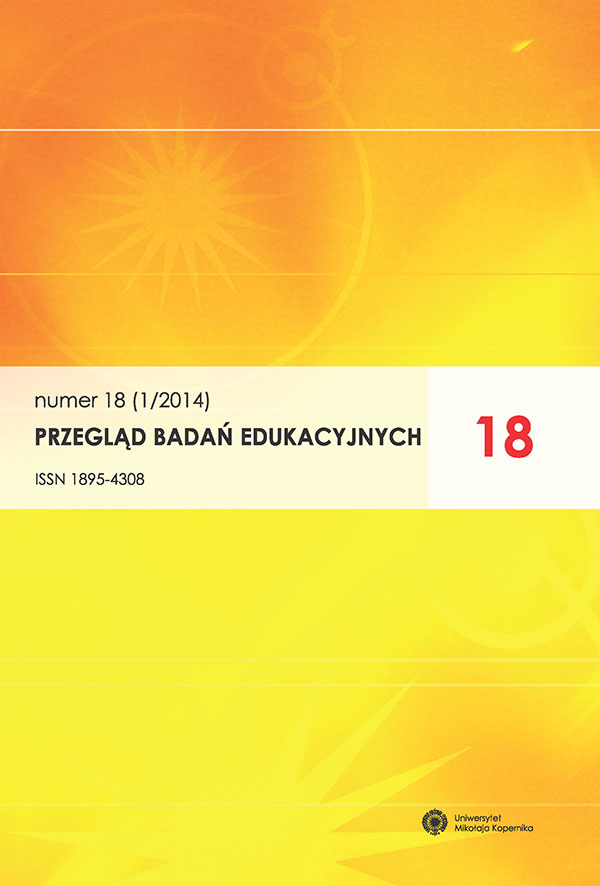The concept and practice of teacher education at the Jagiellonian University with respect to new standards
DOI:
https://doi.org/10.12775/PBE.2014.017Keywords
education for teachers, teacher education, training for teachers, teacher training education standards, psychological and pedagogical preparision, competences, professionalism, candidate to the teaching professionAbstract
The article attempts to describe the state of teacher education at the Jagiellonian University after the introduction of the new standards of preparation for teaching. The concept of teacher education proposed in the College of Education at the Jagiellonian University is based on methodological assumptions of constructivism and the concept of reflective practice and the purpose of meeting and collaboration of faculty and students is to prepare for the teaching profession in such a way that agraduate undertaking work, on the one hand, represents high professional competence, (to complement the knowledge gained in the home institute) and on the other, consciously pursues a certain ethical standard of an educator. The decision to take the course in the College of Education at the Jagiellonian University is the issue of individual, informed choice. Therefore, at the College of Education, students can individually decide when to pursue a course, on which days and hours to attend classes. The essence of the candidate's preparation at the College lies in psycho-pedagogical education to perform the role of the teacher. The course covers the knowledge and skills in terms of psychology and pedagogy, in accordance with Regulation of the Minister of Science and Higher Education of 17.01.2012 on the standards of education in preparation for the teaching profession. Classes on subject didactics in parent institutes, and internships carried out in schools under the supervision of their employees are an integral part of the curriculum of the College of Education and fall within the scope of the duty in the course of pedagogical preparation training. Students receive the certificate of graduation from the College of Education after graduation from applicable studies. This creates the possibility of adopting a different program of action by the student in accordance with their own assumptions, taking full responsibility for the decisions taken.
References
Czerepaniak-Walczak M. (2000), Badanie w działaniu – jego rola w rozwoju profesjonalizmu nauczyciela i w reformowaniu edukacji, [w:]: Kształcenie pedagogiczne w dobie przemian edukacyjnych w Polsce, red. K. Wenta, Materiały Konferencyjne nr 46, Szczecin.
Dylak S. (2000), Konstruktywizm jako obiecująca perspektywa w kształceniu nauczycieli,
[w:] Współczesność a kształcenie nauczycieli, red. H. Kwiatkowska, T. Lewowicki,
S. Dylak,. WSP ZNP, Warszawa.
Dylak S. (2010), Kształtowanie (się) pedagogicznej wiedzy nauczycielskiej – w procesie stawania się nauczycielem – epitafium, [w:] Metodologiczne problemy tworzenia wiedzy w pedagogice. Oblicza akademickiej praktyki, red. J. Piekarski, K. Szmidt, D. Urabaniak- Zając, Wydawnictwo Impuls.
Fish D., Brockman H. (1992), Odmienne podejście do kształcenia nauczycieli, „Forum
Oświatowe” nr 7.
Gołębniak B.D. (1995), Między akademickim przekazem a studiowaniem praktyki, „Studia
Edukacyjne” nr 1.
Gołębniak B.D. (1998), Zmiany edukacji nauczycieli. Wiedza – biegłość – refleksyjność, Wydawnictwo „Edytor”, Toruń–Poznań.
Gołębniak B.D. (2010), Poszukiwanie, dziejowość, dialektyczne uczenie się. Nowe praktyki
edukacyjne w szkole wyższej, [w:] Zmiana kształcenia w szkole wyższej, red. J. Piekarski
i D. Urbaniak-Zając, Wydawnictwo UŁ, Łódź.
Kwaśnica R. (2003), Wprowadzenie do myślenia o nauczycielu, [w:] Pedagogika: podręcznik
akademicki, t. 2, red. B. Śliwerski, Z. Kwieciński, Warszawa.
Kwiatkowska H. (2011), Standardy kształcenia nauczycieli. Opinia o projekcie rozporządzenia Ministra Nauki i Szkolnictwa z dnia 24 maja 2011 roku, „Rocznik Pedagogiczny”, vol. 34.
Kwieciński Z. (1998), Zmienić kształcenie nauczycieli, [w:] Edukacja nauczycielska w perspektywie wymagań zmieniającego się świata red. S. Siemak-Tylikowska. Warszawa.
Pacławska K. (1997), Model nauczyciela w kształceniu uniwersyteckim. Kompetencja do zmiany i rozwoju. Koncepcja nauczyciela w programie Studium Pedagogicznego Uniwersytetu Jagiellońskiego, [w:] Źródła inspiracji współczesnej edukacji nauczycielskiej, red. H. Kwiatkowska, T. Lewowicki. Warszawa.
Pacławska K. (1998), Studium Pedagogiczne UJ (1921–1996). Edukacja dla niepodległości
i rozwoju, [w:] Tradycja i Wyzwania. Edukacja, Niepodległość, Rozwój, red. K. Pacławska,
Wydawnictwo „Universitas”, Kraków.
Schön D. (1987), Educating the Reflective Practitioner, Jossey Bass: London.
Downloads
Published
How to Cite
Issue
Section
Stats
Number of views and downloads: 623
Number of citations: 0



